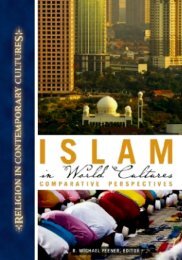Download Here - Islamic Books, Islamic Movies, Islamic Audio, All ...
Download Here - Islamic Books, Islamic Movies, Islamic Audio, All ...
Download Here - Islamic Books, Islamic Movies, Islamic Audio, All ...
Create successful ePaper yourself
Turn your PDF publications into a flip-book with our unique Google optimized e-Paper software.
Page 151 of 215<br />
Ghaemiyeh center of computerized researches www.Ghaemiyeh.com<br />
ABU TALIB The faithful of Quraysh<br />
didnt know who he was! Finally ascribing the tradition to ibn Abbas uncovered the plot<br />
and removed the cover from above the lie. Ibn Abbas was born in the Shib when the<br />
Prophet (s) and the Hashemites were blockaded there three years before the hijra;[498]<br />
the same year, in which Abu Talib died, so how could ibn Abbas see what happened to<br />
narrate such a tradition? Ibn Abbas was free from that! We saw how he answered when<br />
he was asked about the faithfulness of Abu Talib. It was mentioned in the previous<br />
chapter under the title (The Sayings of Ahlul Bayt). b. Then the two liars; as-Sariy and<br />
Abdul Quddooss ascribed the fabricated tradition to ibn Omar.[499] Abdullah bin Omar was<br />
born in the third year of the prophetic mission[500] so he was about seven years old when<br />
Abu Talib died. It was not easy for him in this age to attend or to describe the death of Abu<br />
Talib and it was not possible to depend upon his tradition in this age if it was supposed<br />
that he had attended the event. No one other than these two liars, who fabricated the<br />
tradition and ascribed it to ibn Abbas one time and to ibn Omar the other time, had<br />
.mentioned this false tradition<br />
As for the verse itself, we found it in the middle between two verses: (And when they hear<br />
idle talk they turn aside from it and say: We shall have our deeds and you shall have your<br />
deeds; peace be on you, we do not desire the ignorant. Surely you cannot guide whom<br />
you love, but <strong>All</strong>ah guides whom He pleases, and He knows best the followers of the right<br />
way. And they say: If we follow the guidance with you, we shall be carried off from our<br />
country. What ! have We not settled them in a safe, sacred territory to which fruits of<br />
every kind shall be drawn?- a sustenance from Us; but most of them do not know) 28:55-<br />
57. The first verse concerned the believers. It described their deeds. The third verse<br />
described those, who didnt believe fearing that they might be carried off from their<br />
country. The distorted verse came in the middle between the two. It was addressed to<br />
the Prophet (s). <strong>All</strong>ah said to him that guiding those people was not because of his love to<br />
them and that the Prophet (s) was not the only guider of them; that they werent guided<br />
by hearing the Prophets invitation only, but also by the will and support of <strong>All</strong>ah. This<br />
was not the only verse in the Quran that had this meaning. There were many other<br />
verses such as: 1. (To make them walk in the right way is not incumbent on you, but <strong>All</strong>ah<br />
guides aright whom He pleases) 2:272. 2. (If you desire for their guidance, yet surely <strong>All</strong>ah<br />
does not guide him who leads astray) 16:37. 3. (Do you wish to guide him whom <strong>All</strong>ah has<br />
2














